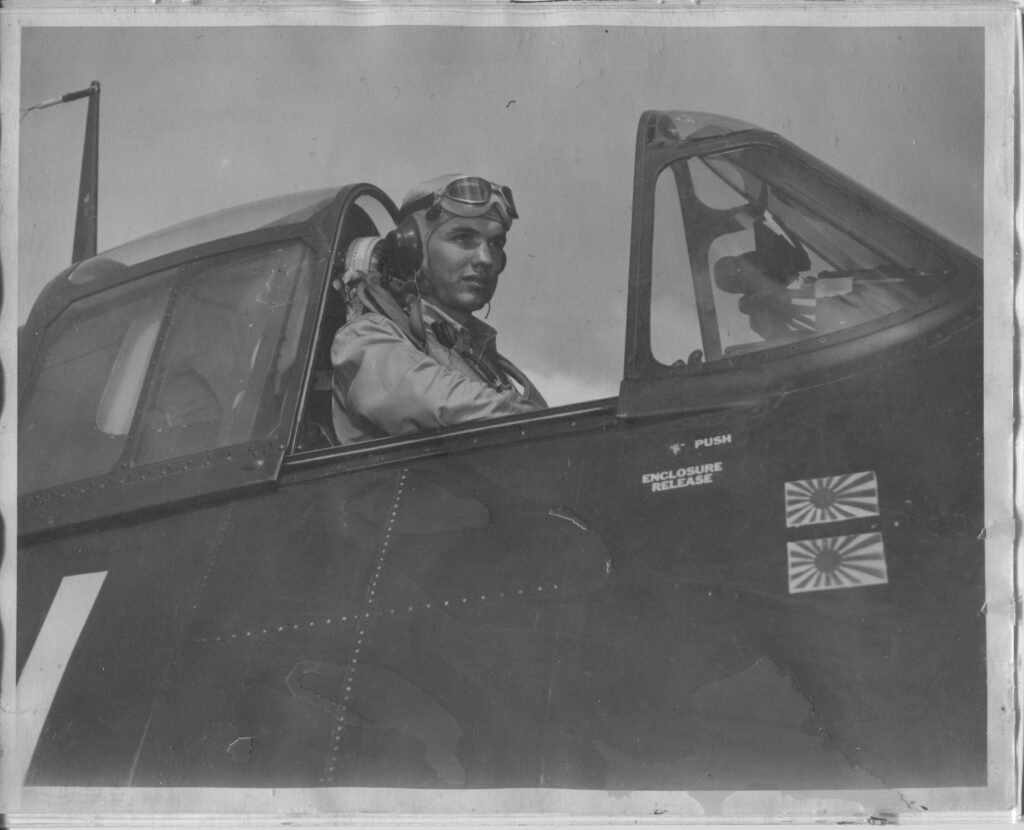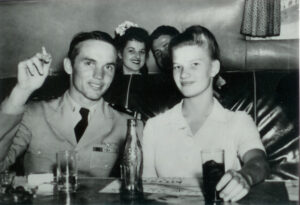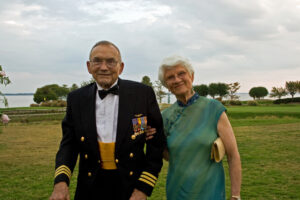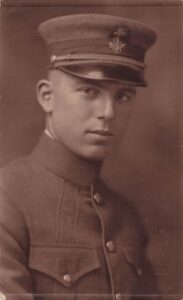 Lewis M. Cobb, my father, had a long and decorated career in the US Navy. He joined the naval reserves as an aviation cadet in 1942 and earned his wings in 1943. He entered combat in the Pacific theater, first flying the F4F Wildcat and then the F6F Hellcat when his squadron was supplied with them. His first two tours in ’43 and ’44 were aboard CV-10, the USS Yorktown, flying with the storied VF-5 squadron. After the ’44 tour, he was sent to Pensacola to train his own division. In 1945 they flew aboard CVL-24, the USS Belleau Wood, as part of the Fighting Thirty, VF-30. After the war he transferred from the reserves into the regular Navy, and saw action in the Korean conflict, and later participated in the Vietnam war. He retired as a line officer, a Commander, in 1966. During his three combat tours in WW2, dad kept a careful diary that was never seen by the censors. His diary and logbook are the primary sources for the stories of Pacific Diary.
Lewis M. Cobb, my father, had a long and decorated career in the US Navy. He joined the naval reserves as an aviation cadet in 1942 and earned his wings in 1943. He entered combat in the Pacific theater, first flying the F4F Wildcat and then the F6F Hellcat when his squadron was supplied with them. His first two tours in ’43 and ’44 were aboard CV-10, the USS Yorktown, flying with the storied VF-5 squadron. After the ’44 tour, he was sent to Pensacola to train his own division. In 1945 they flew aboard CVL-24, the USS Belleau Wood, as part of the Fighting Thirty, VF-30. After the war he transferred from the reserves into the regular Navy, and saw action in the Korean conflict, and later participated in the Vietnam war. He retired as a line officer, a Commander, in 1966. During his three combat tours in WW2, dad kept a careful diary that was never seen by the censors. His diary and logbook are the primary sources for the stories of Pacific Diary.
Dad married mom (Helen) in July of 1945, just before he was to prepare for a fourth combat tour. Thankfully, a few days after they tied the knot the war ended. This is my favorite picture of them before they were married–it reminds me of Bogart’s Casablanca.
 After 65 years of happy marriage, a leaky heart valve did what combat had been unable to do. Dad passed away in 2011. As of this writing, mom is still living. In addition to a legacy of faithfulness as a husband, dad, fighter pilot, and later an Episcopal priest, dad left a treasure trove of diaries, letters, pictures, documents, logbooks, silk maps and more that my brother, sisters, and I have studied and preserved.
After 65 years of happy marriage, a leaky heart valve did what combat had been unable to do. Dad passed away in 2011. As of this writing, mom is still living. In addition to a legacy of faithfulness as a husband, dad, fighter pilot, and later an Episcopal priest, dad left a treasure trove of diaries, letters, pictures, documents, logbooks, silk maps and more that my brother, sisters, and I have studied and preserved.
The Pacific Diary stories I have written are best described as historical fiction. The principal events I write about actually happened to dad. Where the documents, records, and diaries are clear I have kept to the facts as presented. Most of the individuals appearing in the stories are authentic portrayals (including their names), coming from the pages of his diaries or other reliable sources. The materials dad saved provided much of the detail, as did actual naval records and published histories. As always, the ubiquitous Internet allowed me to fill in the gaps on technical and historical detail. I have tried to preserve the general ambiance of the time (yes, dad actually did use the word “swell”) by absorbing it from multiple 1940s era publications. The fiction part of Pacific Diary is this: by necessity, I have taken significant liberty by inventing dad’s thoughts, conversations, radio traffic, and the other day-to-day interactions that form the stuff of life.
 One more matter of interest: Dad was the second pilot in the family. D.K. Cobb, Lewis’s father (my grandfather), was involved in the early days of aviation. He knew Earhart and Lindbergh; his 1930 FAI Annual Sporting pilot’s license (probably a renewal) was signed by Orville Wright. His pilot’s number was only 3 digits long. DK entered the naval reserve as an aviation cadet, but WW1 ended before he deployed. He finished his flight training and had a career that included training civil aviation pilots, flying the US mail, selling airplanes, wing-walking and barnstorming, and even flying in the background of several Hollywood movies. Grandpa went on to train naval aviators in WW2. I reckon that nuts don’t fall too far from the tree (my brother also earned a civil aviation license).
One more matter of interest: Dad was the second pilot in the family. D.K. Cobb, Lewis’s father (my grandfather), was involved in the early days of aviation. He knew Earhart and Lindbergh; his 1930 FAI Annual Sporting pilot’s license (probably a renewal) was signed by Orville Wright. His pilot’s number was only 3 digits long. DK entered the naval reserve as an aviation cadet, but WW1 ended before he deployed. He finished his flight training and had a career that included training civil aviation pilots, flying the US mail, selling airplanes, wing-walking and barnstorming, and even flying in the background of several Hollywood movies. Grandpa went on to train naval aviators in WW2. I reckon that nuts don’t fall too far from the tree (my brother also earned a civil aviation license).
I hope you enjoy the short stories of Pacific Diary. There are plenty more to come.
